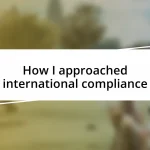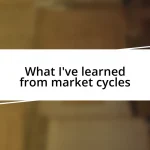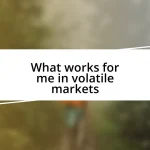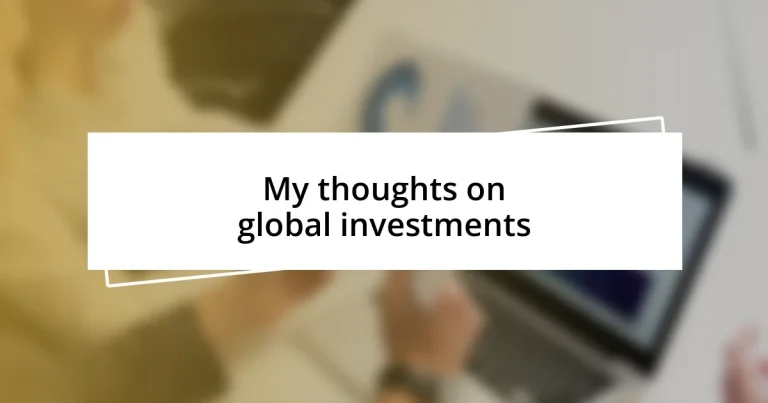Key takeaways:
- Global investments demand an understanding of geopolitical events, economic indicators, and cultural nuances, as they significantly impact market movements.
- Diversification is crucial for managing risk and enhancing returns; it protects against market volatility by spreading investments across various sectors and regions.
- Effective global investing strategies include thorough market research, awareness of political climates, engagement with local experts, and continuous education through financial resources.
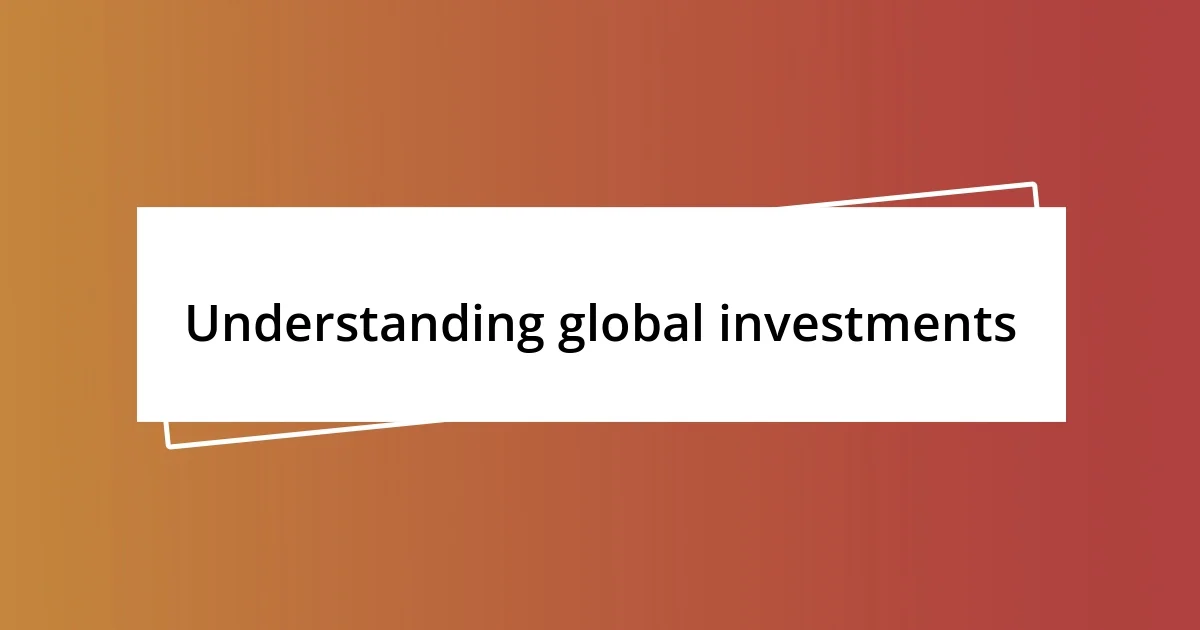
Understanding global investments
Understanding global investments means appreciating the interconnectedness of our world’s economies. I remember my first venture into international markets; it felt like stepping into a vast landscape where each country had its unique opportunities and risks. Every decision I made was influenced not just by local trends but by political stability, currency fluctuations, and even cultural nuances.
As I navigated through various sectors like tech in Silicon Valley and manufacturing in China, I often found myself pondering: how do geopolitical events shape market movements? It became clear to me that global investing wasn’t just about numbers; it was about being vigilant and adaptable. The thrill of watching how an election in a distant country could impact my portfolio here at home was both fascinating and slightly intimidating.
Moreover, understanding global investments also requires a grasp of economic indicators worldwide. I vividly recall analyzing the annual GDP growth rates of emerging markets; it felt like piecing together a puzzle. The excitement of discovering a potential gem in a little-known region fueled my desire to stay informed and engage with diverse investment strategies. Isn’t it intriguing how one small decision can ripple through the global economy?
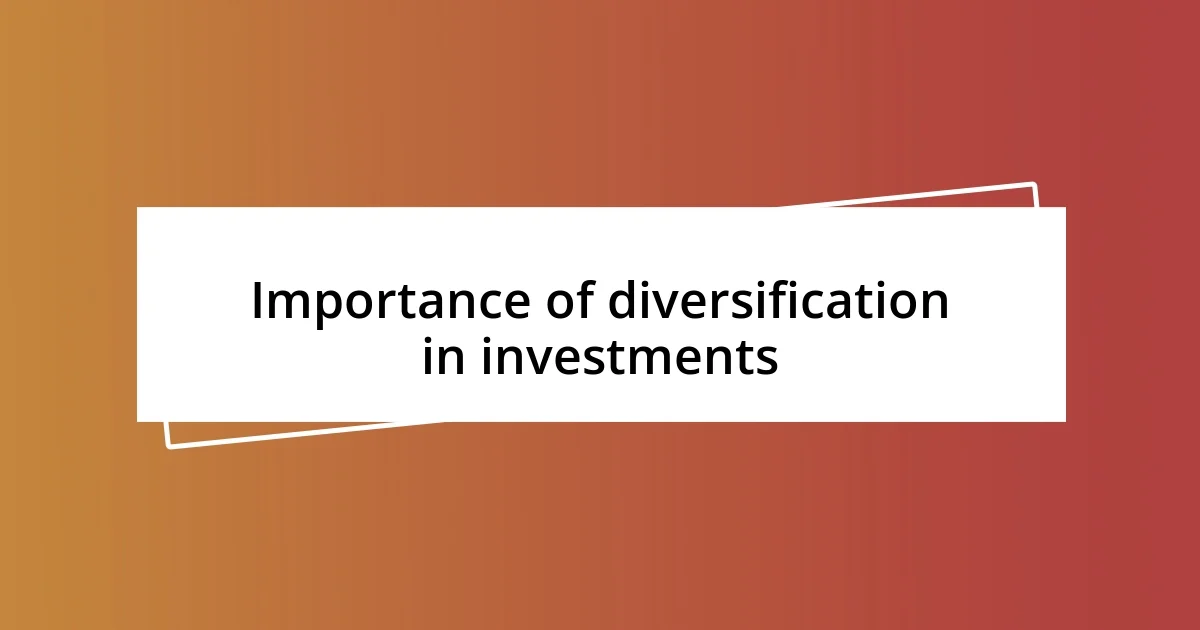
Importance of diversification in investments
Diversification in investments is crucial to managing risk. I learned this the hard way during a market downturn; my portfolio, heavily weighted in a single sector, suffered more than I had anticipated. This experience taught me that by spreading my investments across various asset classes, I could safeguard myself against the volatility of any one market.
Additionally, I’ve seen firsthand how diversification can enhance returns over time. When I began investing in international stocks, it opened my eyes to opportunities in developing economies that my local market didn’t offer. The excitement of watching my diversified portfolio grow, driven by different global forces, has been immensely rewarding.
I like to think of diversification as building a safety net. It doesn’t just protect against downturns; it allows for growth in unexpected ways. There have been times when certain investments struggled, yet others soared, illustrating just how interconnected and dynamic the investment world is. Could you imagine relying on a single investment? For me, that thought is daunting!
| Investment Strategy | Benefits |
|---|---|
| Diversified Portfolio | Reduced Risk |
| Concentrated Portfolio | Higher Potential Returns |
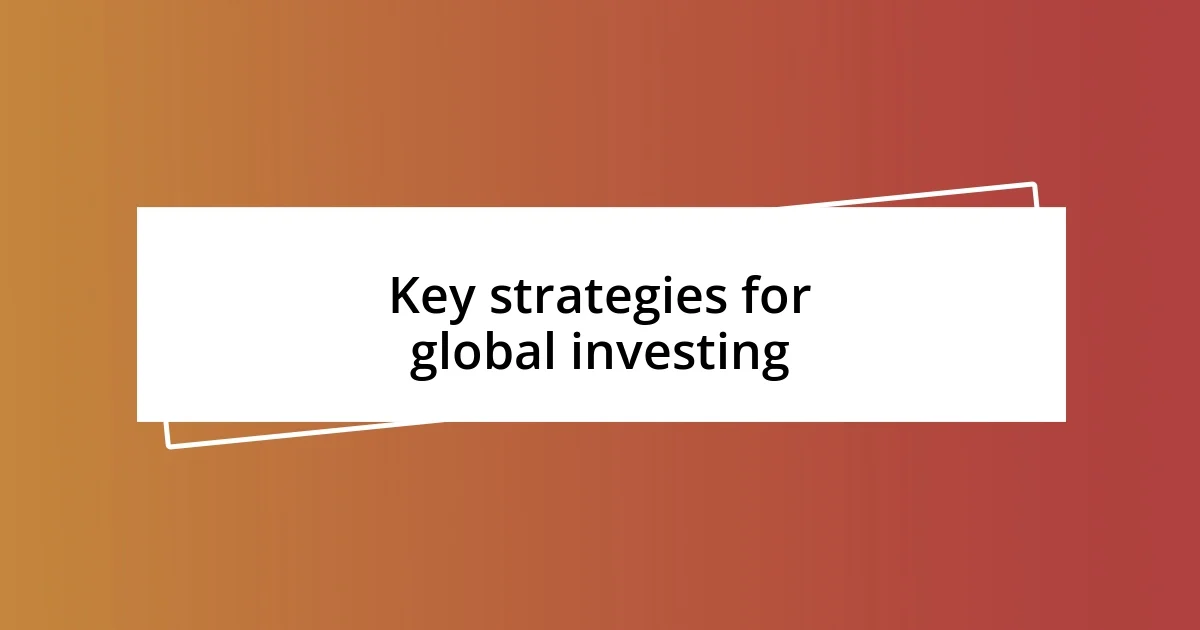
Key strategies for global investing
Investing globally requires a keen sense of timing and awareness. I’ve found it essential to stay updated on global headlines, as political events can have immediate impacts on markets. For example, I remember when trade agreements were suddenly re-evaluated—my stock in an import-export company took a hit, reminding me of the unpredictable nature of global markets.
One of the most effective strategies I’ve adopted is focusing on emerging markets. While these investments can feel risky, the potential rewards are often substantial. I felt a rush of excitement when I first invested in a tech startup in India; it was like watching a seed sprout in rich soil. Eventually, it blossomed into a significant return, reinforcing my belief in venturing beyond traditional markets.
Key strategies for global investing include:
- Market Research: Analyze economic indicators and keep a close watch on local news.
- Geopolitical Awareness: Understand how political shifts can affect market stability.
- Diversification across Borders: Spread investments into different countries and sectors to manage risk.
- Patience and Long-term Vision: Sometimes, waiting can unlock greater potential than immediate buy and sell actions.
These strategies helped me navigate the complexities of global investments with confidence, making the journey not just about the numbers, but about understanding a world that’s constantly evolving.
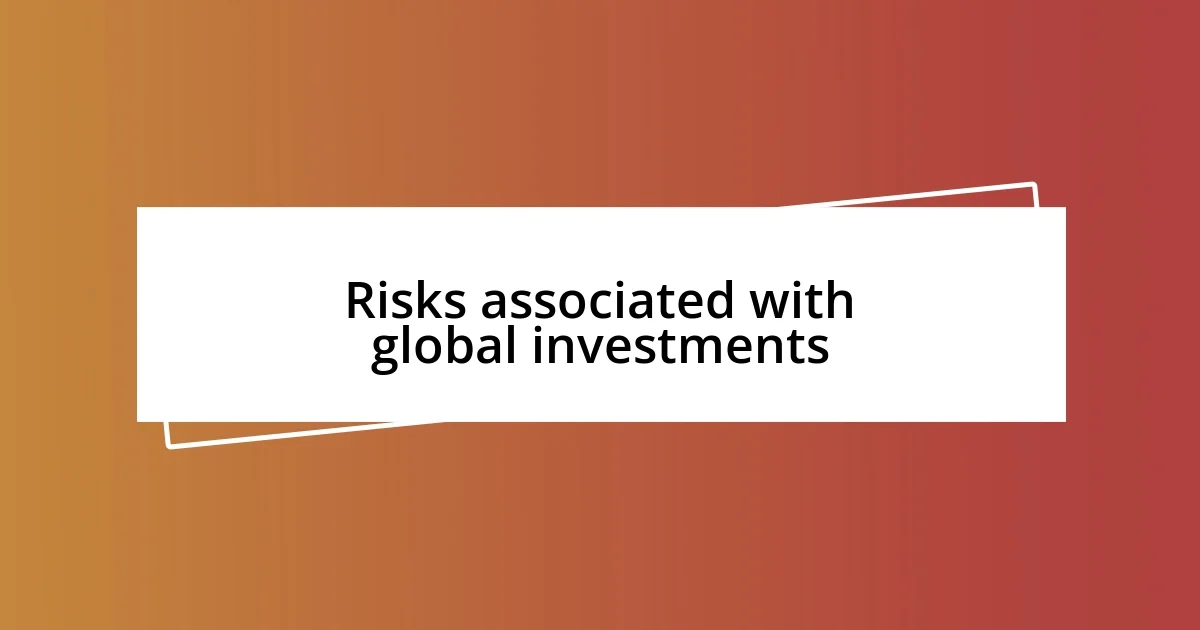
Risks associated with global investments
Investing globally always comes with its own set of risks, and I’ve learned that first-hand. Currency fluctuations can dramatically impact returns, and I recall a time when I invested in a European stock just before the euro took a dive. Watching the exchange rate wreak havoc on my potential gains was a sobering reminder that global investments aren’t just about choosing the right stock; they’re also about keeping a close eye on these external factors.
Political instability can throw a wrench in even the most well-thought-out investment strategies. I remember feeling uneasy during the elections in a country where I had significant investments. The uncertainty led to market volatility, and witnessing that firsthand taught me the importance of having a robust risk management plan. Asking myself how much unpredictability I could tolerate became a crucial part of my investment strategy.
Lastly, let’s not forget about the emotional toll of global investing. While the potential for high returns is thrilling, the anxiety of watching events unfold halfway around the world can be distressing. I’ve often wondered, is it worth the stress? For me, the answer lies in having a diverse portfolio and staying informed—finding a balance between risk and opportunity makes the journey worthwhile.
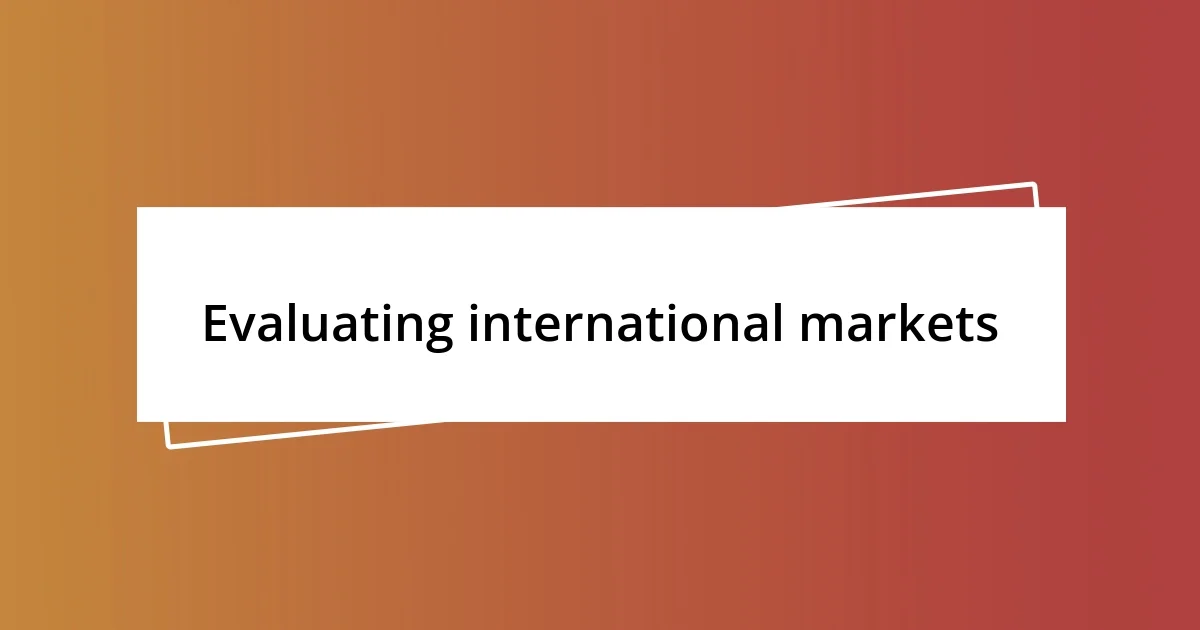
Evaluating international markets
Evaluating international markets requires a blend of analytical skills and an understanding of local cultures. I often find myself diving deep into region-specific economic reports, and sometimes, it’s like peeling an onion—each layer reveals something new. For example, when I started looking at Southeast Asian markets, I quickly realized that consumer behavior there differs significantly from what I’m used to. It made me wonder: how much of an impact does local culture have on market performance?
I remember a time when I was weighing investments in Brazil. The economic trends were promising, but the local political climate felt volatile. I had to ask myself: could I handle the potential rollercoaster of ups and downs? This experience highlighted how political narratives and public sentiment significantly influence market evaluation. It reminds me that being an informed investor isn’t just about spreadsheets; it’s also about the stories behind the numbers.
Furthermore, I’ve learned that engaging with local experts can provide invaluable insights. During one of my trips abroad, I met with a financial advisor who shared incredible market insights that weren’t reflected in the typical reports. This encounter sparked my curiosity about ground-level perspectives; it became clear that understanding international markets goes beyond the surface. The depth of knowledge I’ve gained through these discussions often leads me to make more informed investment choices.
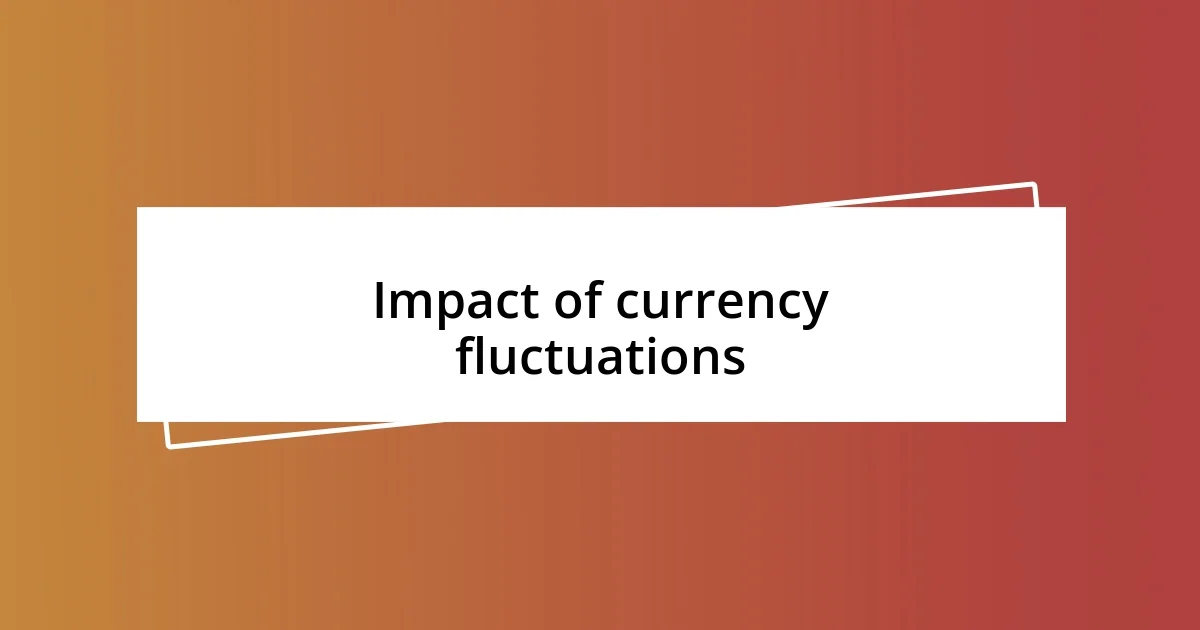
Impact of currency fluctuations
Currency fluctuations can feel like a double-edged sword in global investing. One of my early experiences involved a promising Japanese tech stock. After diligently researching its potential, I felt ready to pull the trigger—but the yen’s sudden drop caught me off guard. I remember the sinking feeling as I realized the currency shift would diminish my returns, even if the company’s performance remained solid. It made me ponder: how do we accurately predict these shifts when investing internationally?
In my journey, I’ve come to understand that currency movements can turn your investment strategy upside down without warning. I once planned to expand my portfolio into various European markets, only to find myself nervously watching the pound fluctuate during Brexit negotiations. It was both fascinating and frustrating. The markets seemed to have a mind of their own, and I couldn’t help but ask myself how much I truly understood about these economic undercurrents.
What about the psychological aspect? I’ve found that seeing your investments affected by currency changes can be emotionally draining. There was a season when the volatility in emerging markets made me second-guess my decisions daily. The uncertainty was palpable, and I often had to remind myself that patience is a virtue in investing—sometimes, you just have to ride the waves and remember that history often repeats itself. This reflection deepened my resolve to stay informed and flexible in my strategies.
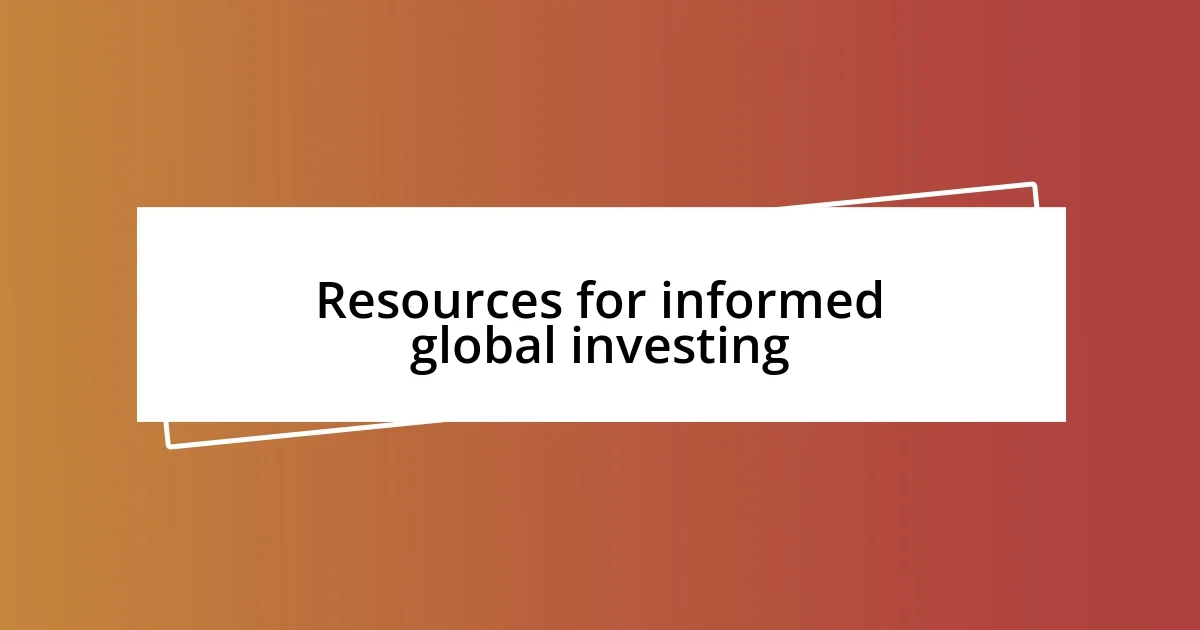
Resources for informed global investing
Identifying the right resources for informed global investing can make all the difference. I’ve found that a combination of financial news platforms, market analysis tools, and economic databases is essential. For instance, I rely on platforms like Bloomberg and CNBC for timely updates. Having real-time information helps me feel more grounded, especially when the markets seem to be in flux. Don’t you ever wonder how investors keep up with everything happening worldwide?
Another resource that has proven invaluable is joining online investment forums and communities. One time, while navigating investment opportunities in Africa, I stumbled upon a dedicated group sharing insights about the region. Communicating with people who have firsthand experience brought a qualitative perspective that data alone couldn’t provide. Engaging in these discussions challenged my preconceived notions and opened my eyes to new possibilities, ultimately shaping my investment strategy.
Finally, I can’t stress enough the importance of financial books and podcasts focused on global investing. I remember listening to a podcast that broke down investment strategies in emerging markets, and it completely changed my perspective. The guests shared their successes and pitfalls, which resonated with my own experiences. This blend of theoretical and practical advice can be a game-changer, as the insights I gained prompted me to diversify my portfolio more thoughtfully. Have you tapped into these resources yet?





